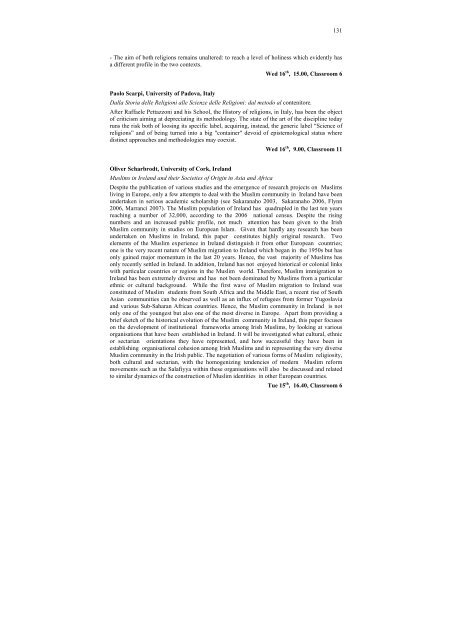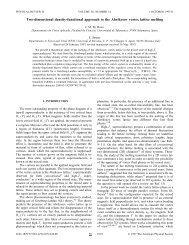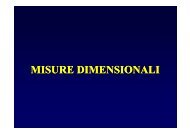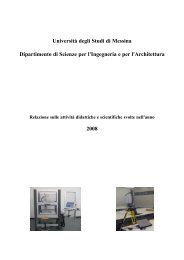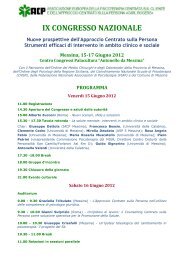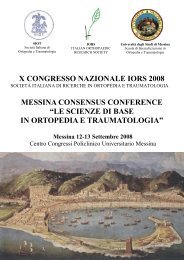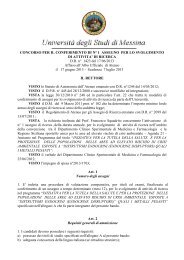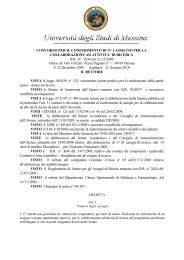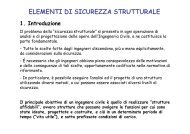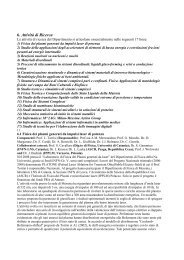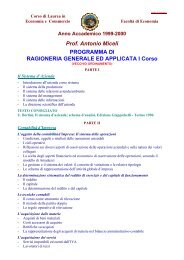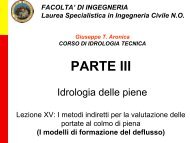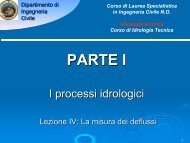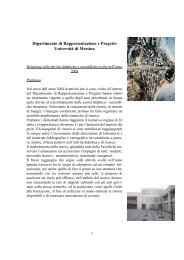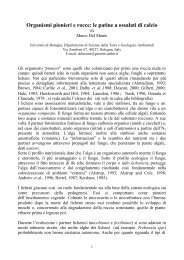PROGRAMME AND ABSTRACTS - Università degli Studi di Messina
PROGRAMME AND ABSTRACTS - Università degli Studi di Messina
PROGRAMME AND ABSTRACTS - Università degli Studi di Messina
You also want an ePaper? Increase the reach of your titles
YUMPU automatically turns print PDFs into web optimized ePapers that Google loves.
- The aim of both religions remains unaltered: to reach a level of holiness which evidently has<br />
a <strong>di</strong>fferent profile in the two contexts.<br />
Paolo Scarpi, University of Padova, Italy<br />
131<br />
Wed 16 th , 15.00, Classroom 6<br />
Dalla Storia delle Religioni alle Scienze delle Religioni: dal metodo al contenitore.<br />
After Raffaele Pettazzoni and his School, the History of religions, in Italy, has been the object<br />
of criticism aiming at depreciating its methodology. The state of the art of the <strong>di</strong>scipline today<br />
runs the risk both of loosing its specific label, acquiring, instead, the generic label “Science of<br />
religions” and of being turned into a big "container" devoid of epistemological status where<br />
<strong>di</strong>stinct approaches and methodologies may coexist.<br />
Oliver Scharbrodt, University of Cork, Ireland<br />
Muslims in Ireland and their Societies of Origin in Asia and Africa<br />
Wed 16 th , 9.00, Classroom 11<br />
Despite the publication of various stu<strong>di</strong>es and the emergence of research projects on Muslims<br />
living in Europe, only a few attempts to deal with the Muslim community in Ireland have been<br />
undertaken in serious academic scholarship (see Sakaranaho 2003, Sakaranaho 2006, Flynn<br />
2006, Marranci 2007). The Muslim population of Ireland has quadrupled in the last ten years<br />
reaching a number of 32,000, accor<strong>di</strong>ng to the 2006 national census. Despite the rising<br />
numbers and an increased public profile, not much attention has been given to the Irish<br />
Muslim community in stu<strong>di</strong>es on European Islam. Given that hardly any research has been<br />
undertaken on Muslims in Ireland, this paper constitutes highly original research. Two<br />
elements of the Muslim experience in Ireland <strong>di</strong>stinguish it from other European countries;<br />
one is the very recent nature of Muslim migration to Ireland which began in the 1950s but has<br />
only gained major momentum in the last 20 years. Hence, the vast majority of Muslims has<br />
only recently settled in Ireland. In ad<strong>di</strong>tion, Ireland has not enjoyed historical or colonial links<br />
with particular countries or regions in the Muslim world. Therefore, Muslim immigration to<br />
Ireland has been extremely <strong>di</strong>verse and has not been dominated by Muslims from a particular<br />
ethnic or cultural background. While the first wave of Muslim migration to Ireland was<br />
constituted of Muslim students from South Africa and the Middle East, a recent rise of South<br />
Asian communities can be observed as well as an influx of refugees from former Yugoslavia<br />
and various Sub-Saharan African countries. Hence, the Muslim community in Ireland is not<br />
only one of the youngest but also one of the most <strong>di</strong>verse in Europe. Apart from provi<strong>di</strong>ng a<br />
brief sketch of the historical evolution of the Muslim community in Ireland, this paper focuses<br />
on the development of institutional frameworks among Irish Muslims, by looking at various<br />
organisations that have been established in Ireland. It will be investigated what cultural, ethnic<br />
or sectarian orientations they have represented, and how successful they have been in<br />
establishing organisational cohesion among Irish Muslims and in representing the very <strong>di</strong>verse<br />
Muslim community in the Irish public. The negotiation of various forms of Muslim religiosity,<br />
both cultural and sectarian, with the homogenizing tendencies of modern Muslim reform<br />
movements such as the Salafiyya within these organisations will also be <strong>di</strong>scussed and related<br />
to similar dynamics of the construction of Muslim identities in other European countries.<br />
Tue 15 th , 16.40, Classroom 6


